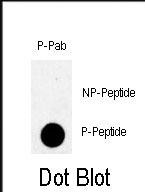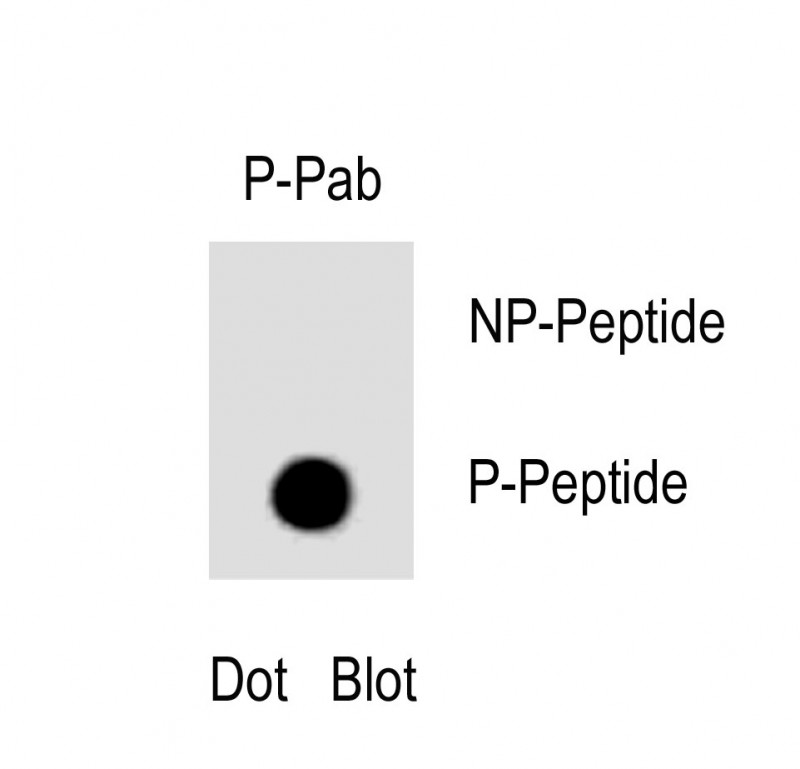

| WB | 咨询技术 | Human,Mouse,Rat |
| IF | 咨询技术 | Human,Mouse,Rat |
| IHC | 咨询技术 | Human,Mouse,Rat |
| ICC | 技术咨询 | Human,Mouse,Rat |
| FCM | 咨询技术 | Human,Mouse,Rat |
| Elisa | 咨询技术 | Human,Mouse,Rat |
| Aliases | Serine/threonine-protein kinase TBK1, NF-kappa-B-activating kinase, T2K, TANK-binding kinase 1, TBK1, NAK |
| Entrez GeneID | 29110 |
| WB Predicted band size | 83.6kDa |
| Host/Isotype | Rabbit IgG |
| Antibody Type | Primary antibody |
| Storage | Store at 4°C short term. Aliquot and store at -20°C long term. Avoid freeze/thaw cycles. |
| Species Reactivity | Human |
| Immunogen | This TBK Antibody is generated from rabbits immunized with a KLH conjugated synthetic phosphopeptide corresponding to amino acid residues surrounding S172 of human TBK. |
| Formulation | Purified antibody in PBS with 0.05% sodium azide. |
+ +
以下是关于Phospho-TBK1(S172)抗体的参考文献示例,包含文献名称、作者及摘要概括:
---
1. **文献名称**:*STING regulates intracellular DNA-mediated, type I interferon-dependent innate immunity*
**作者**:Ishikawa H, Barber GN
**摘要**:该研究阐明了STING通路在识别胞内DNA后激活天然免疫的机制,利用Phospho-TBK1(S172)抗体证实病毒感染或DNA刺激后,TBK1在S172位点的磷酸化是其激酶活化的关键步骤,进而驱动IRF3介导的I型干扰素产生。
2. **文献名称**:*Phosphorylation of the autophagy receptor optineurin restricts Salmonella growth*
**作者**:Wild P, et al.
**摘要**:研究揭示了自噬受体optineurin通过TBK1依赖性磷酸化介导抗菌自噬的过程。通过Phospho-TBK1(S172)抗体检测,发现沙门氏菌感染后TBK1活性增强,进而促进optineurin磷酸化,抑制细菌增殖。
3. **文献名称**:*ULK1 phosphorylates Beclin-1 to activate autophagy in response to nutrient deprivation*
**作者**:Egan DF, et al.
**摘要**:探讨能量应激下自噬启动的分子机制,使用Phospho-TBK1(S172)抗体证明ULK1与TBK1的协同作用。研究发现,TBK1在S172位点的磷酸化对自噬小体形成及清除受损线粒体至关重要。
4. **文献名称**:*The kinase TBK1 controls IgA class switching through non-canonical NF-κB signaling*
**作者**:Lafont E, et al.
**摘要**:研究揭示了TBK1通过调控非经典NF-κB通路影响B细胞IgA类别转换。通过Phospho-TBK1(S172)抗体的Western blot分析,证实TBK1活化状态与B细胞中免疫球蛋白产生的直接关联。
---
**注**:以上文献为示例,实际引用时建议通过PubMed或Web of Science核对具体信息,确保作者、标题及摘要内容与原文一致。
Phospho-TBK1 (S172) antibodies are essential tools for studying the activation of TANK-binding kinase 1 (TBK1), a key regulator of innate immune signaling. TBK1. a member of the IκB kinase (IKK) family, plays a central role in antiviral and inflammatory responses by phosphorylating downstream targets like IRF3 and IRF7. which drive type I interferon (IFN) production. Its activation is tightly regulated, with phosphorylation at Serine 172 (S172) being a critical event. This modification occurs in the kinase activation loop, typically triggered by pattern recognition receptors (PRRs) sensing viral RNA/DNA or other danger signals. Phosphorylated TBK1 then forms signaling complexes with adaptors like MAVS or STING, amplifying immune responses.
Antibodies specific for TBK1 phosphorylated at S172 enable researchers to detect and quantify TBK1 activation status in various contexts, including viral infections, autoimmune diseases, and cancer. They are widely used in techniques like Western blotting, immunofluorescence, and flow cytometry to investigate TBK1-dependent pathways, such as the cGAS-STING axis or RIG-I-like receptor (RLR) signaling. Dysregulation of TBK1 activity is linked to chronic inflammation, neurodegeneration, and tumor immunity, making these antibodies valuable for both mechanistic studies and therapeutic development. Proper validation using knockout controls or phosphatase treatment is critical to ensure specificity, as cross-reactivity with related kinases (e.g., IKKε) can occur.
×